Overview
This article serves as a compassionate guide to understanding the monthly costs associated with 24/7 in-home care, addressing the emotional concerns families may face. The expenses typically range from $18,000 to $25,000 per month, influenced by several key factors. These include:
- The level of assistance required
- Caregiver qualifications
- Geographic location
- Payment structures
By highlighting these elements, we aim to empower families to make informed financial decisions regarding long-term care.
In addition, we recognize that navigating these costs can be overwhelming. Our goal is to provide clarity and support, ensuring you feel confident in your choices. Understanding the financial landscape of in-home care is crucial, not just for budgeting, but for securing the best possible support for your loved ones.
As you consider these factors, remember that we are here for you. Your comfort and peace of mind are our top priorities, and we are committed to helping you through this journey. If you have any questions or need assistance, please don’t hesitate to reach out. Together, we can find the right care solution for your family.
Introduction
Navigating the world of in-home care can feel overwhelming, especially when considering the various options available for your loved ones in need of assistance. We understand how important it is to find the right support. With the growing preference for 24/7 in-home care, families are increasingly drawn to this holistic approach. This allows individuals—particularly seniors and those with chronic illnesses—to receive continuous support in the comfort of their own homes.
This comprehensive caregiving service not only addresses daily living activities but also enhances emotional well-being. It’s a vital consideration for families who want the best for their loved ones. As the demand for such services rises, it’s essential to understand the intricacies of 24/7 in-home care. From its benefits and costs to the factors influencing pricing, knowing these details helps you make informed decisions that align with both care needs and financial realities.
Remember, you’re not alone in this journey. We’re here for you, ready to assist in finding the right care solution that brings peace of mind and comfort to your family.
Understanding 24/7 In-Home Care: What It Is and How It Works
24/7 residential support is a holistic caregiving service designed to provide ongoing assistance for individuals, particularly seniors and those with chronic conditions, who require help with daily living tasks. This service encompasses a wide range of support, including:
- Personal hygiene
- Medication management
- Meal preparation
- Companionship
This ensures that clients receive the care they need at all times.
The framework of 24/7 residential support typically involves caregivers working in shifts, guaranteeing that someone is always available to meet the client’s needs. This constant presence not only fosters a sense of security but also enhances the emotional well-being of clients, allowing them to remain comfortably in their own homes. Did you know that research shows 88% of Americans prefer receiving essential long-term support services at home as they age? This highlights the growing demand for such services (The Associated Press-NORC Center for Public Affairs Research).
Real-world examples illustrate the profound impact of 24/7 caregiving on individuals with chronic illnesses. For instance, a case study titled “Unlocking Emotional Stability: The At-Home Support Advantage for Seniors” underscores how at-home assistance significantly enhances emotional stability and overall well-being for seniors. By providing consistent support, caregivers from Best Care Nurses Registry help alleviate feelings of isolation and anxiety, which are common among those managing chronic health conditions.
This commitment aligns with Best Care’s dedication to personalized service, ensuring that clients receive tailored support that addresses both their physical and emotional needs.
The benefits of round-the-clock domestic support extend beyond physical assistance; they also encompass emotional and psychological support. Geriatric professionals emphasize the importance of continuous support for individuals with chronic illnesses, noting that it can lead to improved health outcomes and a better quality of life. Additionally, Best Care Nurses Registry aids households in optimizing long-term insurance benefits and offers various payment options, helping families navigate the financial aspects of in-home assistance.
Moreover, technology plays a crucial role in enhancing service delivery and operational efficiency in the home support industry. By leveraging innovative solutions, Best Care ensures that caregivers can provide the highest standard of assistance while maintaining effective communication with family members.
Understanding the structure of 24/7 domestic assistance is vital for families considering this option for their loved ones. It highlights the compassion and dedication involved in delivering care, ensuring that clients receive the highest standard of support tailored to their unique needs.
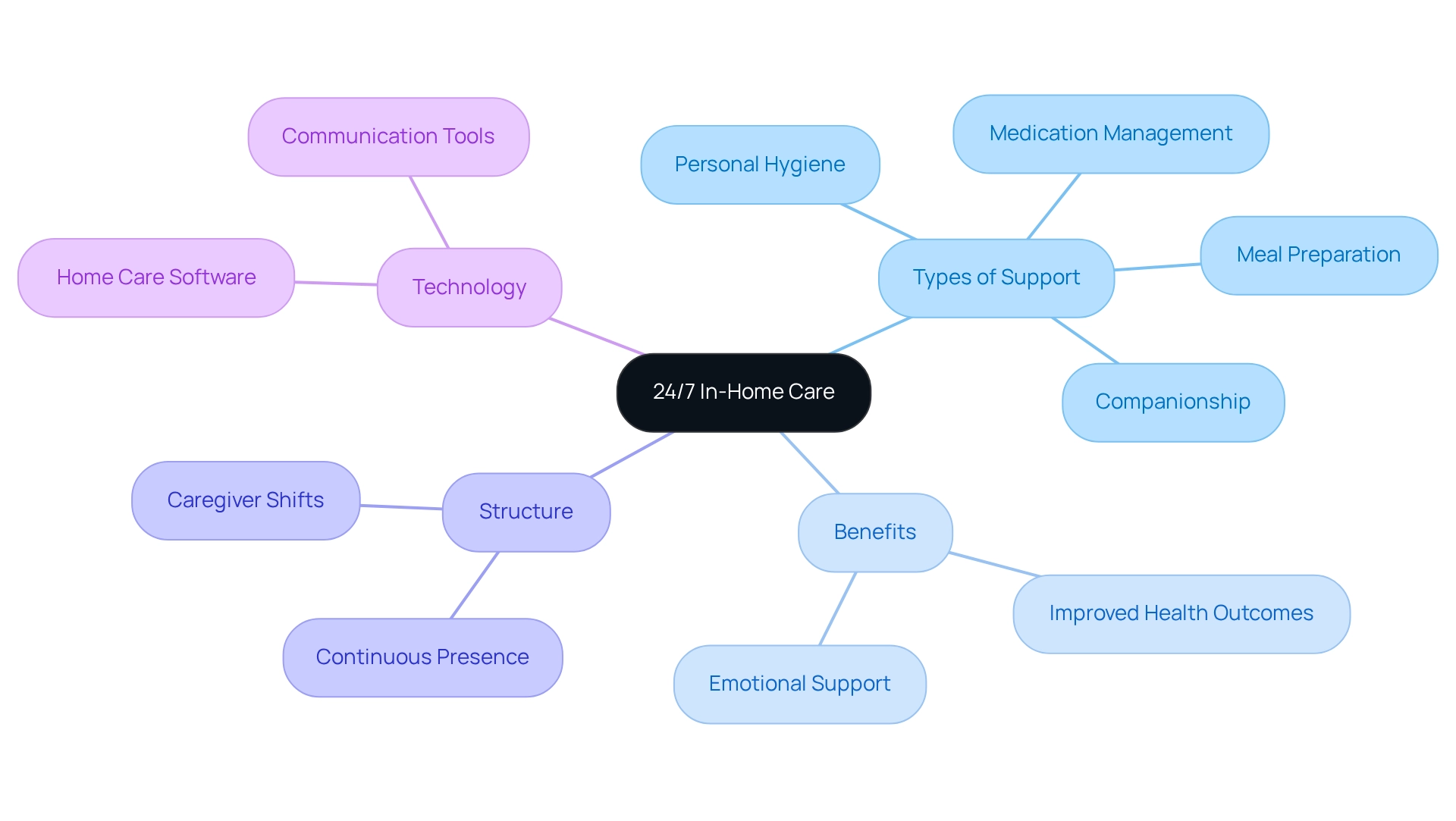
Key Factors Influencing the Cost of 24/7 In-Home Care
Several key factors significantly influence the cost of 24/7 in-home care, and understanding these can empower families to make informed decisions:
-
Level of Assistance Required: The complexity of support needed plays a crucial role in determining pricing. For instance, basic assistance with daily activities, provided by Certified Nursing Assistants (CNAs) and Home Health Aides (HHAs), may be less expensive than skilled nursing care, which requires specialized training and expertise. CNAs and HHAs are vital in assisting patients of all ages with daily activities, including bathing, grooming, toileting, transferring, light housekeeping, meal preparation, medication reminders, and companionship. This ensures that relatives remain updated on their loved ones’ conditions.
-
Caregiver Qualifications: The experience and qualifications of caregivers can greatly affect rates. More experienced or specialized caregivers, such as registered nurses (RNs) or licensed practical nurses (LPNs), typically command higher fees due to their advanced skills and training. However, CNAs and HHAs offer valuable support for activities of daily living, making them a cost-effective option for many families.
-
Geographic Location: Costs can vary significantly based on geographic location. Metropolitan regions frequently experience elevated rates because of rising living expenses and demand for services. For instance, the typical yearly expense for a nursing home facility with a private room reached $116,800 in 2023, reflecting the financial implications of assistance in densely populated areas.
-
The total number of hours needed each week directly impacts how much 24/7 in-home care costs per month. Families should consider whether they need full-time care or if a live-in caregiver, who provides care during specified shifts, might be a more economical option. Best Care Nurses Registry offers flexible scheduling, allowing caregivers to assist for just a few hours each day or around the clock, depending on client needs. Significantly, there is no minimum hour requirement for services, which can assist families in controlling expenses efficiently while ensuring their loved ones receive the essential support.
-
Agency Fees: When employing through an agency, extra charges may apply for administrative expenses and caregiver matching services. These fees can vary widely, so it’s essential to clarify all potential costs upfront. Best Care Nurses Registry collaborates with the majority of Long Term Care insurances directly, assisting individuals in navigating the complexities of coverage and payment.
Understanding these elements is crucial for households as they navigate the complexities of how much 24/7 in-home care costs per month for long-term support. Recent trends suggest that occupancy rates for assisted living communities have risen from 77% to 84%, leading to increasing expenses overall. Furthermore, the Expense of Assistance Survey underscores substantial rises in long-term support expenses, stressing the necessity for families to plan wisely for future support requirements.
Financial consultants frequently suggest preparing for these expenses in advance, particularly when evaluating the typical expenses linked to various tiers of assistance. As Matt Neal, Chief Development Officer for The Key, notes, “This is helpful because one caregiver may be seeing very different behaviors from your loved one during the day than another who works in the evening.” This insight highlights the significance of comprehending caregiver dynamics in relation to support expenses.
For more information or to discuss your specific needs, please contact Best Care Nurses Registry at (888) 203-2529.
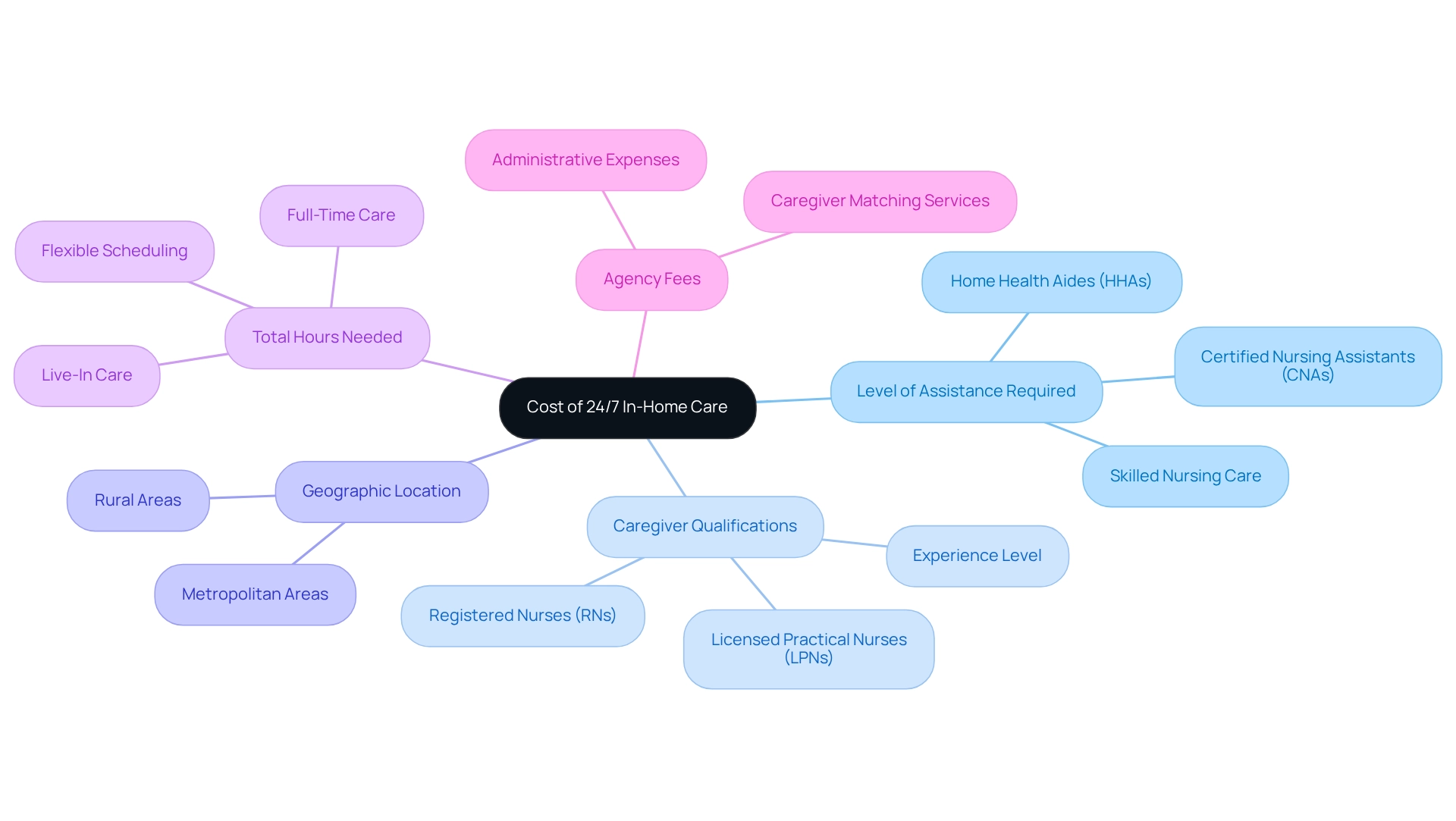
Exploring Pricing Structures: Hourly vs. Monthly Rates
When families explore options for 24/7 in-home care, they often face two primary pricing structures that can significantly impact their decisions.
-
Hourly Rates: In this model, caregivers are billed based on the actual hours worked. This method allows for flexibility, enabling households to adjust the level of support as needed. However, for ongoing assistance, it’s crucial to consider how much 24/7 in-home care costs per month, as expenses can accumulate quickly due to the necessity of multiple caregivers managing various shifts. For instance, in South Florida, the average hourly fee for domestic assistance can vary considerably, typically ranging from $20 to $30 per hour. This variability makes it essential for families to assess their budget against potential overall costs. The rising demand for in-home assistance services is reflected in the employment of 8,450 Home Health and Personal Support Aides in the North Coast Region of California, highlighting a growing need for such services across the nation.
-
Monthly Rates: Alternatively, some agencies, like Best Care Nurses Registry, provide a fixed monthly charge for ongoing support. This structure can be more cost-effective for families requiring full-time assistance, as it usually includes all caregiver expenses without the unpredictability associated with hourly billing. Families should thoughtfully evaluate their specific needs and financial situations to understand how much 24/7 in-home care costs per month and determine which pricing model aligns best with their support requirements.
At Best Care Nurses Registry, we begin the personalized home health service process with a thorough assessment of the household’s needs. Our compassionate caregivers, including Certified Nursing Assistants (CNAs) and Home Health Aides (HHAs), play vital roles in creating customized support plans that cater to individual circumstances. To illustrate the differences, consider a case study where a family opted for hourly assistance versus a monthly fee.
The family in need of 24/7 support wished to understand how much 24/7 in-home care costs per month. They found that while hourly rates offered immediate flexibility, the total expenses over a month surpassed those of a flat monthly charge that encompassed all necessary services. This underscores the importance of thorough research and understanding pricing structures when selecting a home health support solution. As Scott Witt, Managing Partner at Elder Home Care, states, “As a supporter for seniors, the main philosophy has been to listen, educate, and empower individuals to make informed choices about assistance options.”
Ultimately, families should weigh the pros and cons of each pricing model, considering factors such as the level of support required, the number of caregivers needed, and their overall budget. Consulting with financial advisors can also provide valuable insights into evaluating expenses, ensuring families make informed decisions that align with their financial and caregiving needs. Additionally, referencing the case study titled ‘Choosing the Right Home Health Service Agency’ can further illustrate the process of selecting an assistance agency and emphasize the importance of thorough research.
To embark on your tailored support journey, please call (888) 203-2529 to arrange a conversation about your needs. At Best Care Nurses Registry, we recognize the significance of pets in your loved one’s life, and we proudly offer pet-friendly services to ensure a comfortable and familiar environment for everyone involved.
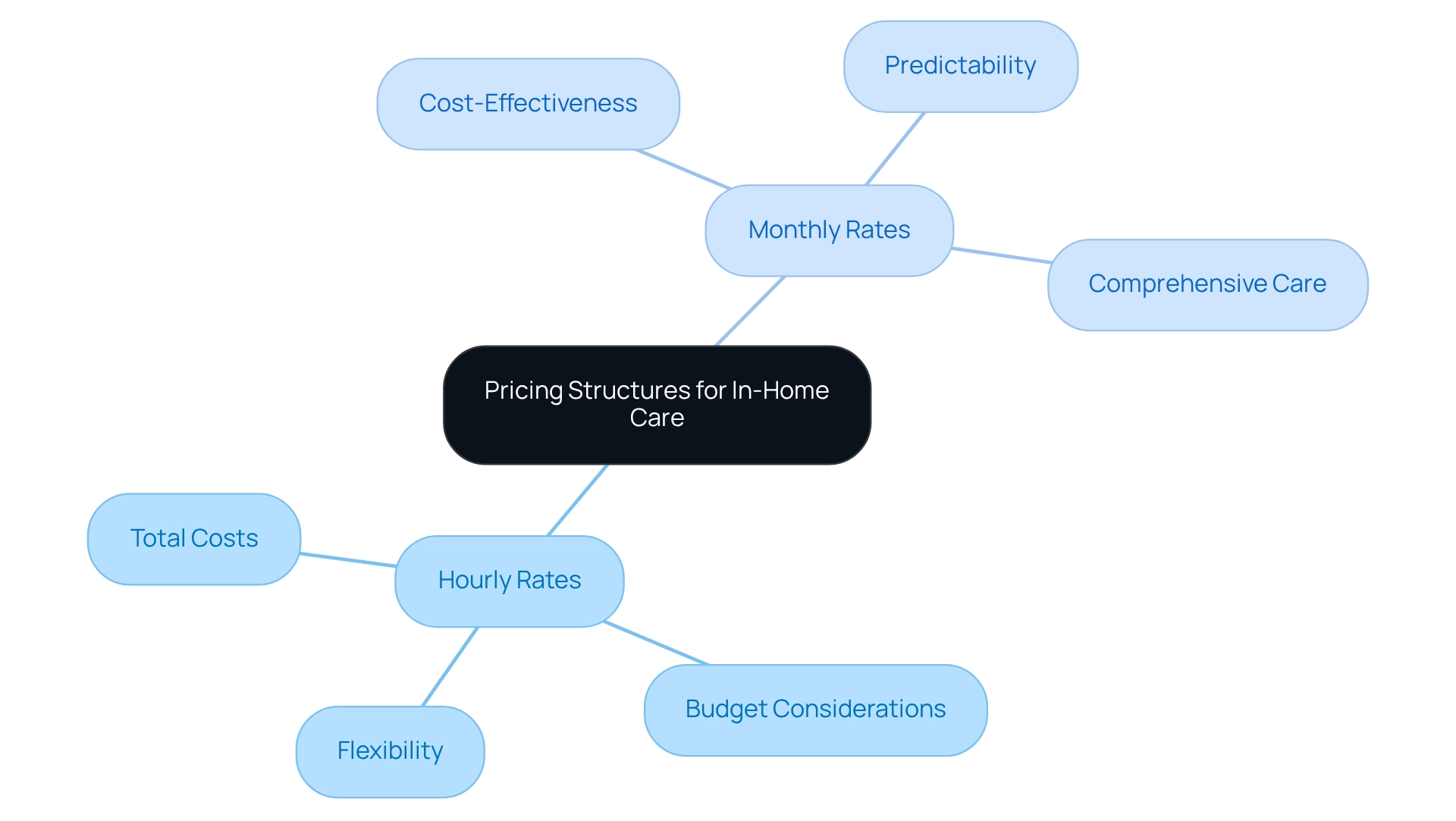
Comparing Costs: 24/7 In-Home Care vs. Assisted Living and Nursing Homes
When assessing support options, it is crucial to consider the financial implications of each choice. Understanding the costs involved can feel overwhelming, but we’re here to help you navigate this journey.
When considering how much 24/7 in-home care costs per month, the average expense for comprehensive in-home support generally falls between $18,000 and $25,000. This variation is influenced by factors such as the particular level of assistance needed and the geographic location of the service. In addition, households should be aware that Medicare may assist with short-term, medically necessary home health services, which can help offset some costs.
Assisted Living: Assisted living facilities typically charge between $3,000 and $6,000 per month. This fee usually includes housing, meals, and a basic level of care, making it a more economical choice compared to in-home care for certain households. Significantly, assisted living community expenses rose by 10% in 2024, arriving at a national median expense of $70,800 each year. Comprehending the elements affecting these expenses, such as location, size of living space, and available amenities, is crucial for families to make informed choices.
Nursing Homes: Expenses for nursing homes can be significantly higher, averaging between $7,000 and $10,000 per month. The precise sum relies on the facility’s reputation, location, and the level of assistance required. Families should thoughtfully consider these expenses in relation to the advantages of each choice. For example, while in-home assistance offers the benefit of preserving independence and comfort in familiar surroundings, assisted living provides a community setting with social interaction. Nursing facilities, conversely, are frequently vital for individuals needing extensive medical assistance.
Comprehending these financial factors is crucial for relatives to make educated choices regarding long-term support. Consulting with a qualified elder law attorney can also assist in organizing strategies to finance extended support and develop a thorough long-term support plan. As Jeff Hoyt, Editor in Chief of MoneyTips.com, observes, assessing the worth of domestic assistance compared to institutional support is essential for households exploring these options.
By considering all these factors, families can better anticipate potential increases in expenses over time. Remember, you are not alone in this process, and there are resources available to help guide you every step of the way.
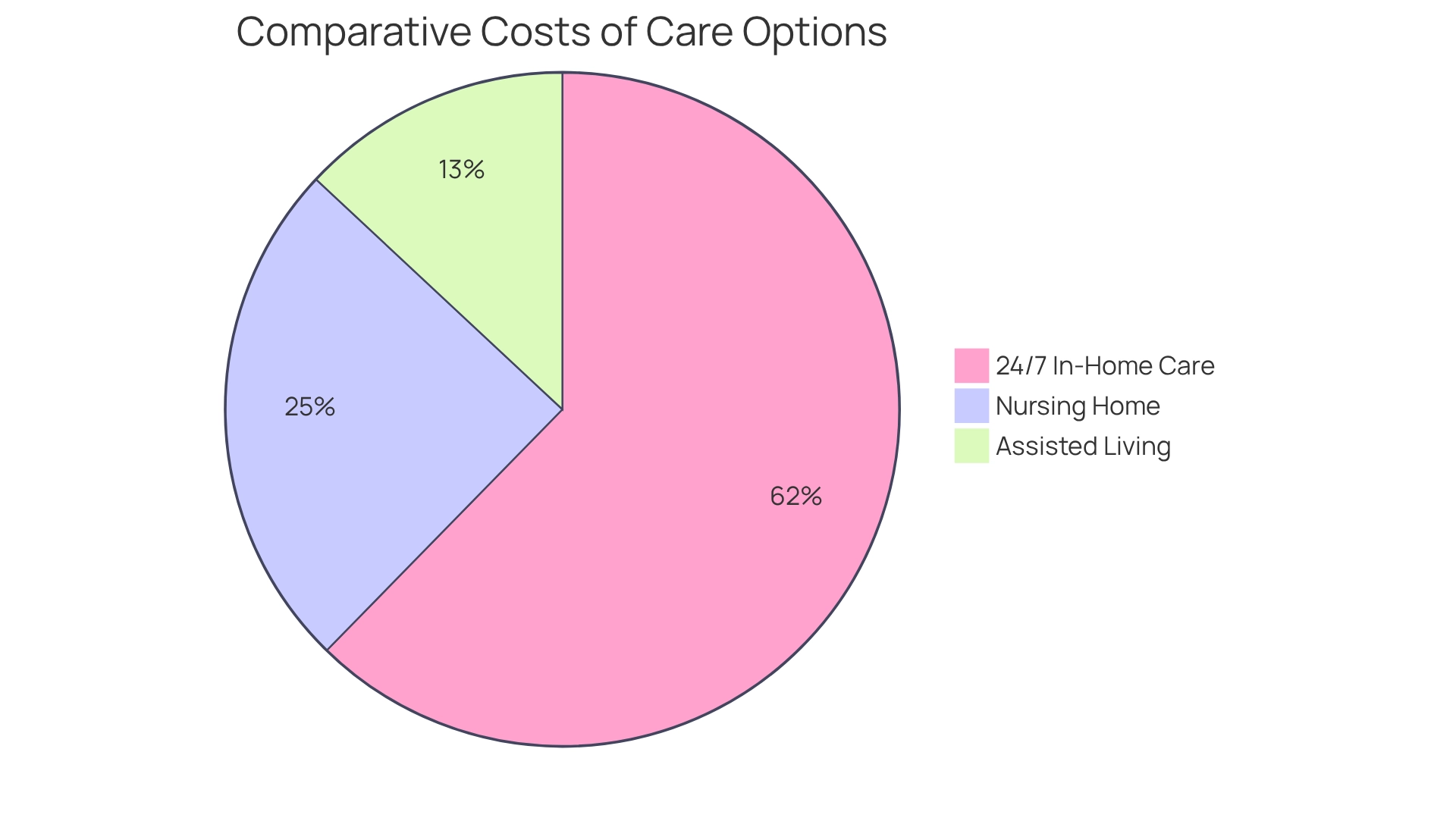
The Impact of Geographic Location on Care Costs
Geographic location significantly influences the cost of round-the-clock in-home assistance, and it’s essential to recognize the key factors at play.
Urban areas often see higher care expenses due to increased demand for services and elevated living costs. For example, urban centers frequently face a shortage of caregivers, which can drive prices even higher. Conversely, rural areas typically offer lower rates; however, they may struggle with a limited pool of qualified caregivers, potentially affecting the quality and availability of services.
Each state has its own regulations governing home assistance services, leading to variations in pricing structures. Stricter regulations may result in higher expenses due to compliance needs, while more lenient states might offer more competitive pricing. Additionally, local market conditions play a crucial role. A recent study found that nearly 42% of the variation in health expenditure among the commercially insured stems from local systemic factors. This highlights the importance of understanding local market conditions when assessing service expenses. Families are encouraged to conduct thorough research on local rates to grasp how much 24/7 in-home care costs per month and how their geographic location affects their overall budget for assistance.
An analysis of individuals moving to different spending areas revealed that those relocating to regions with higher medical spending tend to experience increased spending growth over time. This indicates that the economic conditions of a place can have lasting impacts on personal medical expenses, including domestic assistance costs. Specifically, moving to a metro area with a 10% higher spending level is associated with a predicted 4.2% increase in medical spending, as noted by industry analyst William C. Johnson. This underscores the financial implications of geographic location on treatment expenses.
Industry experts emphasize that geographic location is a vital factor in determining in-home support pricing. The financial effects of location on expenses are significant, as demonstrated by Johnson’s insights. Furthermore, Best Care Nurses Registry aims to optimize long-term support insurance benefits and offers various payment options, including assistance with the assignment of benefits (AOB) for Long Term Support insurance. This can vary by location and further influence overall expenses. By understanding these factors, families can navigate the complexities of home assistance pricing more effectively and make informed decisions that align with their financial capabilities and support needs.
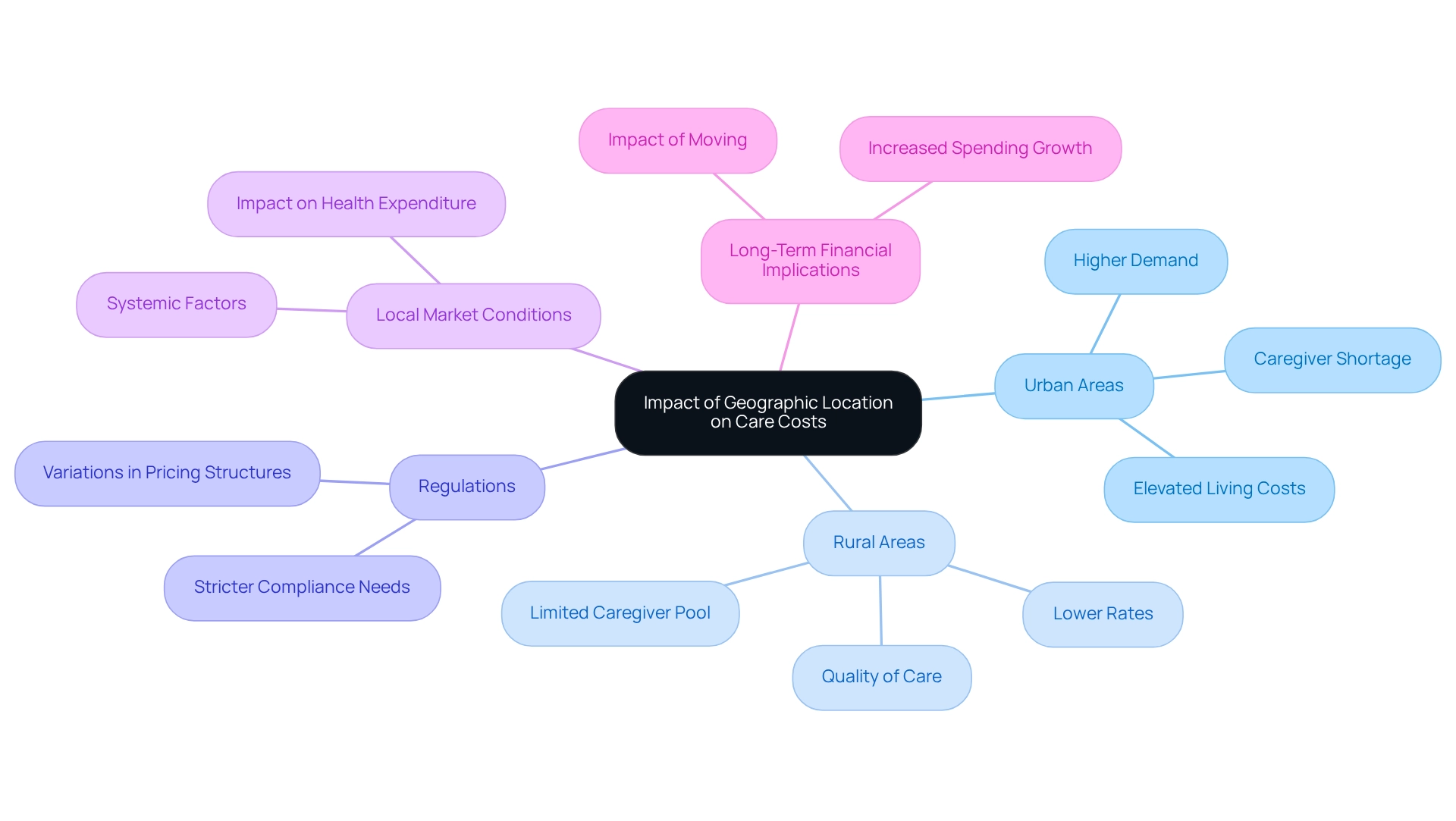
Financial Assistance and Insurance Options for In-Home Care
Families seeking financial assistance for 24/7 in-home care have several viable options to explore:
-
Long-Term Support Insurance: A substantial portion of newly issued long-term support policies—96%—now include home assistance benefits that are at least equal to those for facility support. It’s essential for policyholders to thoroughly review their specific terms and conditions to understand the extent of coverage for domestic services. At Best Care Nurses Registry, we are committed to helping households navigate these policies, ensuring you can optimize your long-term insurance advantages. We accept most Long Term Care insurances directly on your behalf, and our team will assist in completing the necessary Assignment of Benefits (AOB) forms to facilitate direct payments from your insurance carrier. This means you can often start services right away, without any out-of-pocket payment, unless your policy has an elimination period.
-
Medicare: While Medicare typically does not include long-term at-home assistance, it may offer coverage for short-term home health services under certain circumstances, such as after a hospital stay. However, it’s important to note that Medicare does not assist with activities of daily living, which are usually covered by private duty caregivers. Understanding these nuances can help families maximize their benefits.
-
Medicaid provides coverage for home-based services for qualified individuals, with details differing by state. Families should investigate their state’s regulations and eligibility requirements to determine the level of support available.
-
Veterans Benefits: Veterans may be eligible for various advantages that can assist with in-home support services. It’s advisable for families to contact the Department of Veterans Affairs (VA) to explore available options and eligibility criteria.
-
State Initiatives: Numerous states offer programs aimed at helping low-income individuals with home support expenses. Researching local resources can reveal additional financial support opportunities that may not be widely known.
As Jesse Slome, director of the American Association for Long-Term Insurance, states, “Your money pays for long-term insurance, but it’s your health that truly purchases it.” By comprehending these financial aid alternatives, households can more effectively manage the costs associated with 24/7 in-home care, ensuring their loved ones receive the essential assistance they need. Best Care’s expertise in helping families with long-term insurance claims further emphasizes our dedication to offering individualized support.
Please be aware that although we accept AOBs (Assignment of Benefits), you will be responsible for the payment of the services referred to you, in the event your carrier does not pay any or part of the entire bill. Furthermore, specific documents must be completed prior to assistance commencing, and with current technology, these documents can be emailed or faxed to the main party accountable. Once our paperwork is received, assistance can commence promptly.
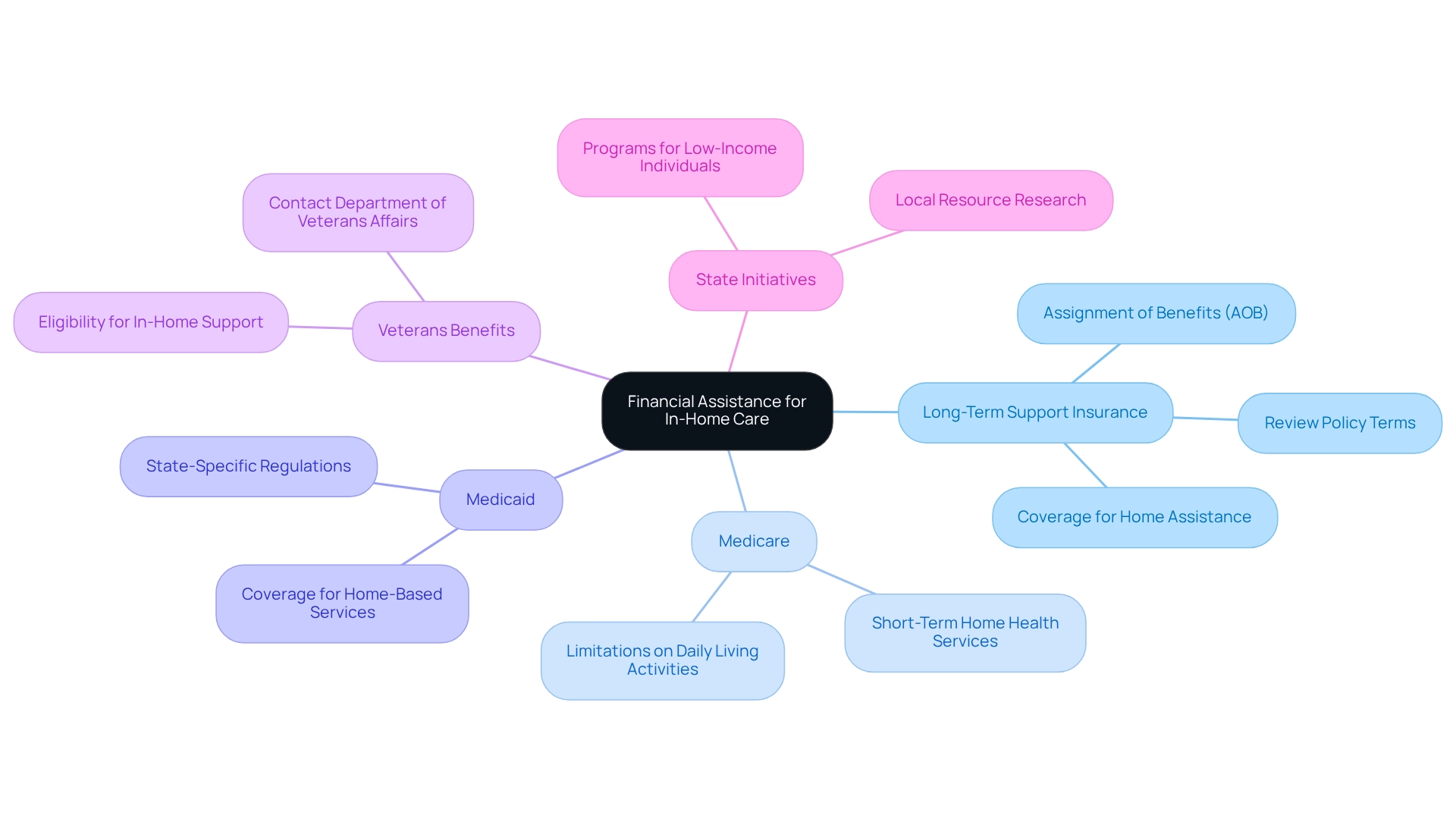
Step-by-Step Guide: Calculating Your Monthly 24/7 In-Home Care Costs
Calculating the monthly costs for 24/7 in-home care can be straightforward when you approach it step by step, ensuring you feel informed and prepared.
-
Determine the Hourly Rate: Begin by researching local rates for in-home support services. For instance, if the average rate in your area is $30 per hour, this figure serves as your baseline. For context, Wyoming’s average hourly rate for private pay home care is $34. Understanding these rates can ease any worries about affordability.
-
Calculate Daily Costs: Next, multiply the hourly rate by the total number of hours in a day (24 hours). For example, $30 x 24 = $720 per day. This clear calculation helps you visualize daily expenses, making it more manageable.
-
Calculate Weekly Expenses: Now, multiply the daily expense by 7 days. Continuing with our example, $720 x 7 = $5,040 per week. This step provides a broader view of your financial commitment.
-
Calculate Monthly Expenses: To find the monthly expense, multiply the weekly expense by 4.33, which represents the average number of weeks in a month. Thus, $5,040 x 4.33 equals approximately $21,835. Knowing this figure allows you to plan ahead.
-
Consider Extra Expenses: It’s important to include any additional charges that may arise, such as agency fees, medical supplies, or specialized assistance needs. Acknowledging these potential costs can help you create a more accurate budget.
-
Explore Payment Options: At Best Care Nurses Registry, we understand that every household has unique financial needs. That’s why we offer various flexible payment alternatives for home services, including private pay (with credit cards accepted), long-term insurance (including assignment of benefits from long-term insurance companies), Medicaid, VA Aid and Attendance Pension, and other assistance programs. Understanding these options can empower you to manage expenses effectively and ensure you receive the personalized support you deserve.
By following these steps, families can develop a practical budget to understand the monthly costs of 24/7 in-home care, ensuring they are prepared for this financial commitment. Moreover, combining effective budgeting techniques with accessible support programs can significantly alleviate the financial burden of home care, allowing families to focus on providing the best care for their loved ones. As Scott Witt, Managing Partner at Elder Home Assistance, emphasizes, “As an advocate for seniors, the primary philosophy has been to listen, educate…” This approach can guide families in navigating the complexities of expenses and options. Additionally, the dedicated team at Best Nurses Registry, including experienced professionals like Brianna (brianna@bestcare.net, Phone: 321-750-5303) and Lucinda (lucinda@bestcare.net, Phone: 305-307-5223), is always ready to assist in customizing support solutions tailored to individual needs.
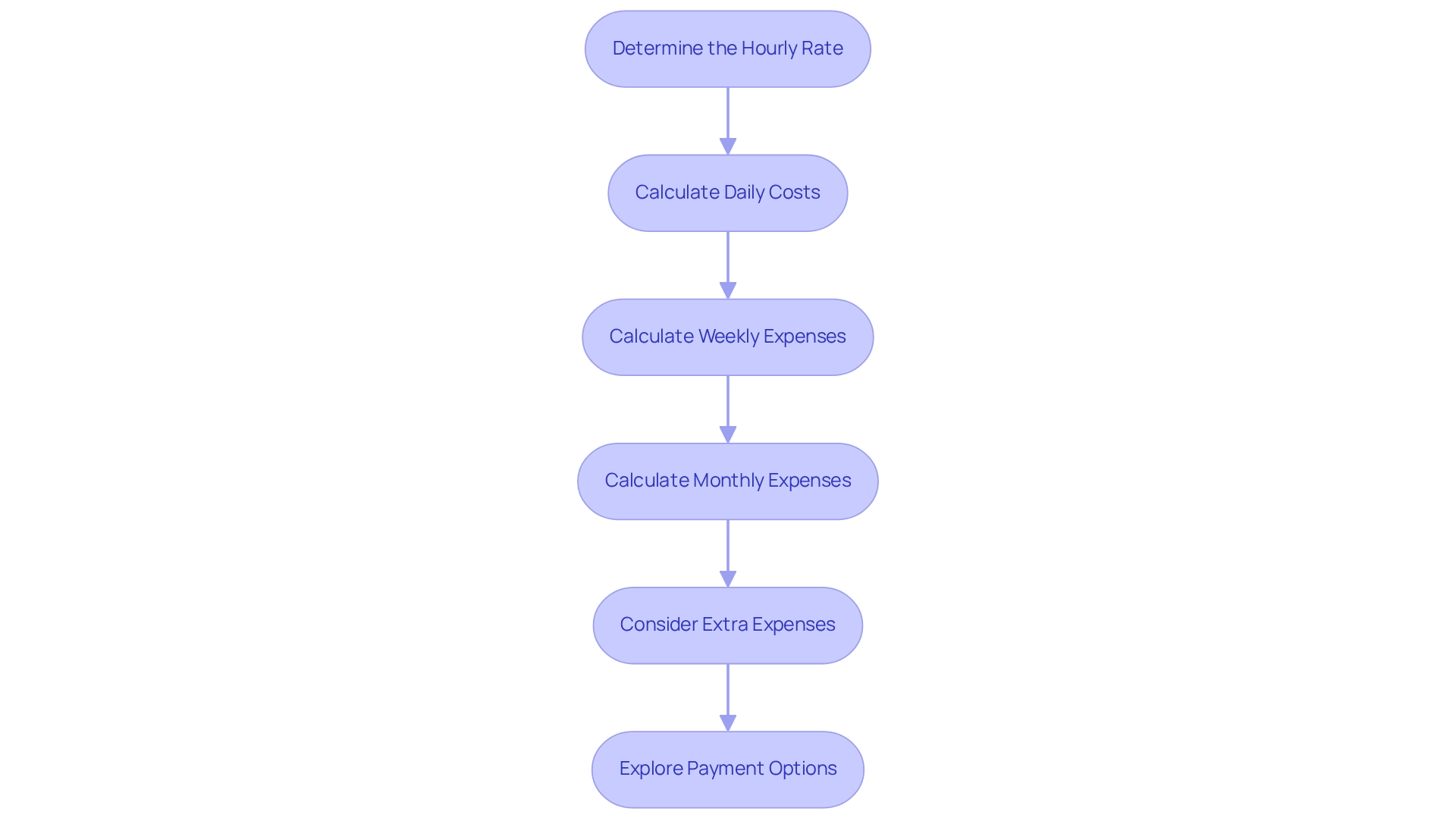
Frequently Asked Questions About 24/7 In-Home Care Costs
Here are some frequently asked questions regarding 24/7 in-home care costs:
-
What is the typical expense of around-the-clock domestic assistance?
The average monthly cost for 24/7 in-home care typically ranges from $18,000 to $25,000. This variation is influenced by factors such as the level of assistance required, geographical location, and the specific services offered. For context, the national median expense of assisted living is $4,995 monthly, which can assist families in assessing their choices when contemplating home support. -
Does insurance provide for home assistance?
Insurance coverage for in-home care can vary significantly based on the policy. Long-term support insurance frequently incorporates clauses for in-home assistance services, permitting relatives to instruct their providers to pay Best Care Nurses Registry directly via an Assignment of Benefits (AOB). Best Care Nurses Registry accepts most Long Term Care insurances directly on your behalf.
However, Medicare typically provides restricted coverage, mainly for skilled nursing services instead of personal assistance. As Bonnie Vengrow, a freelance journalist and content strategist, notes, “Is Your Family Considering Home Care? We can assist you in comprehending your choices and identifying the optimal plan for your household, your finances, and your loved one’s support requirements. It’s important to note that while we accept AOBs, you will be responsible for the payment of the services referred to you if your carrier does not pay any or part of the entire bill. -
Are there financial assistance programs available?
Yes, several financial assistance programs can help with home care costs. These comprise Medicaid, veterans benefits, and several state-specific initiatives aimed at assisting families in handling the costs related to in-home support. -
How do I choose a caregiver?
Selecting the right caregiver involves considering their qualifications, experience, and compatibility with your loved one’s needs. Numerous home assistance agencies, including Best Nurses Registry, offer matching services to simplify this process, ensuring a suitable match for both the caregiver and the client. Once the necessary paperwork is completed, assistance can often commence right away, with caregivers referred within hours. -
What services are offered in 24/7 home assistance?
Services offered in 24/7 in-home care can encompass a wide range of support, including personal care, medication management, meal preparation, and companionship. These services are customized to address the specific requirements of the client, ensuring thorough support. It’s important to note that how much does 24/7 in home care cost per month is significantly affected by geographical location and the intensity of care needed, as highlighted in the case study ‘Factors Affecting Home Health Care Costs.
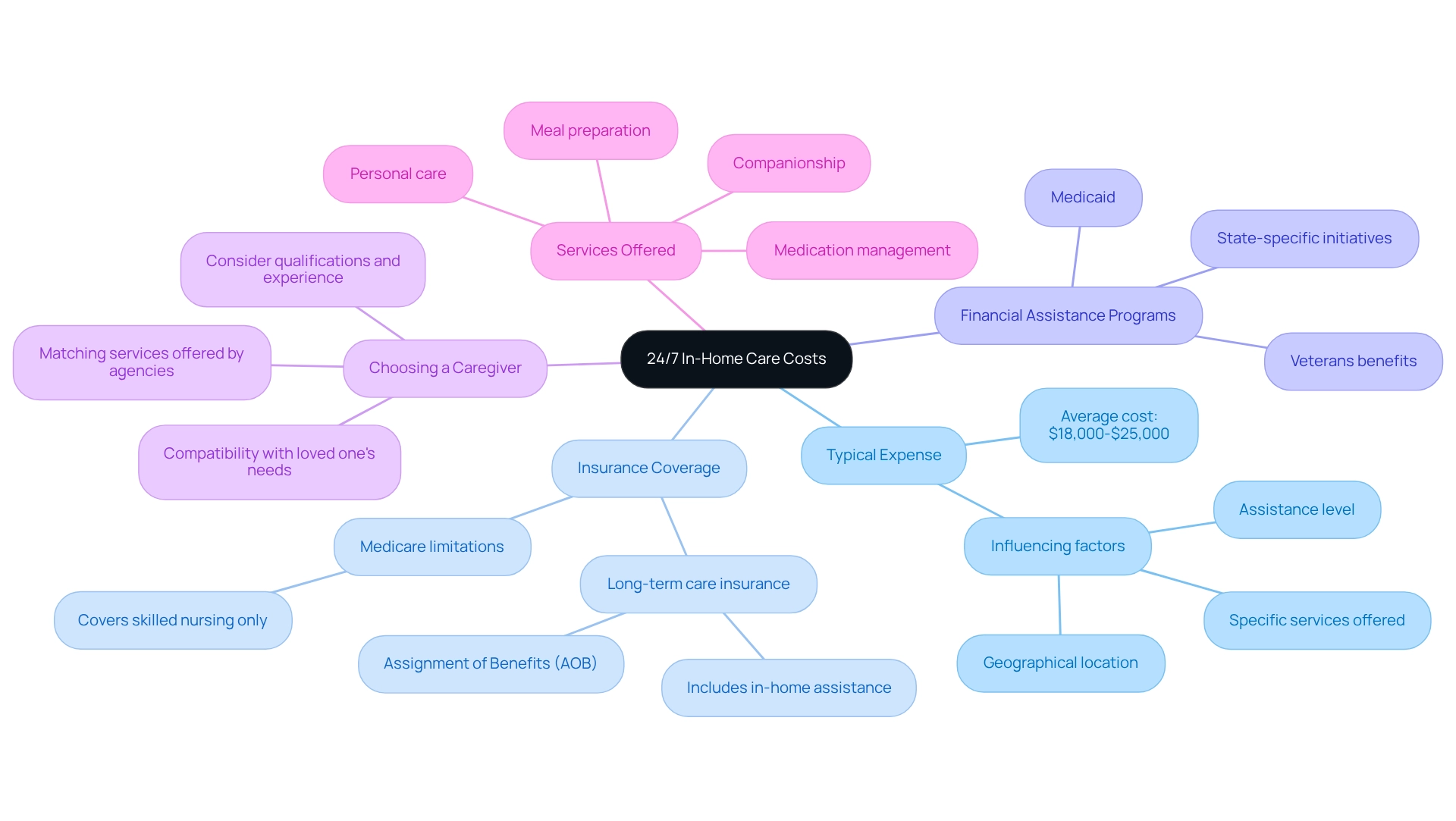
Conclusion
Navigating the complexities of 24/7 in-home care can feel overwhelming, but understanding its benefits, costs, and the various factors that influence pricing can provide clarity. This holistic caregiving service offers continuous support tailored to individual needs, particularly for seniors and those with chronic illnesses. It ensures not only physical assistance but also emotional well-being in the comfort of home. Families should reflect on the specific level of care required, caregiver qualifications, geographic location, and the pricing structure—whether hourly or monthly—to make informed decisions that truly suit their needs.
When comparing costs between 24/7 in-home care, assisted living, and nursing homes, families face significant financial implications. While in-home care may appear more expensive, it fosters greater independence and comfort. Exploring available financial assistance options, including long-term care insurance and state programs, can further lighten the burden of these costs.
Ultimately, the journey toward securing the right care solution is filled with critical choices. By staying informed and leveraging available resources, families can ensure that their loved ones receive the highest standard of care, nurturing both physical health and emotional support. As the demand for in-home care continues to grow, families are empowered to make decisions that align with their caregiving needs and financial realities, ensuring peace of mind in this essential aspect of life. Remember, we’re here for you, and your comfort is our priority.
Frequently Asked Questions
What is 24/7 residential support?
24/7 residential support is a holistic caregiving service designed to provide ongoing assistance for individuals, particularly seniors and those with chronic conditions, who need help with daily living tasks such as personal hygiene, medication management, meal preparation, and companionship.
How does the structure of 24/7 residential support work?
The framework typically involves caregivers working in shifts, ensuring that someone is always available to meet the client’s needs. This constant presence fosters a sense of security and enhances the emotional well-being of clients, allowing them to remain comfortably in their own homes.
What are the emotional benefits of 24/7 caregiving?
Continuous support from caregivers helps alleviate feelings of isolation and anxiety, which are common among individuals managing chronic health conditions. This support significantly enhances emotional stability and overall well-being for seniors.
How does Best Care Nurses Registry personalize its services?
Best Care Nurses Registry is dedicated to providing tailored support that addresses both the physical and emotional needs of clients, ensuring that they receive the highest standard of care.
What factors influence the cost of 24/7 in-home care?
Several key factors influence the cost, including the level of assistance required, caregiver qualifications, geographic location, total number of hours needed each week, and agency fees.
What types of caregivers are available for in-home support?
Caregivers can include Certified Nursing Assistants (CNAs) and Home Health Aides (HHAs) for basic assistance, as well as more specialized caregivers like registered nurses (RNs) and licensed practical nurses (LPNs) for skilled nursing care.
How can families manage the costs of in-home care?
Families can manage costs by considering flexible scheduling options, as Best Care Nurses Registry allows caregivers to assist for just a few hours each day or provide round-the-clock care without a minimum hour requirement.
What role does technology play in 24/7 residential support?
Technology enhances service delivery and operational efficiency, allowing caregivers to provide high standards of assistance while maintaining effective communication with family members.
How can families get more information about in-home care services?
Families can contact Best Care Nurses Registry at (888) 203-2529 for more information or to discuss specific needs related to in-home care.











